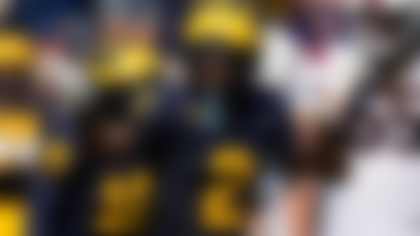ENGLEWOOD, Colo. -- The Denver Broncos returned to work Wednesday, trying their best to focus on football 48 hours after the suicide of teammate Kenny McKinley.
"It will be a tough week and all the guys handle it differently, but the one constant is everybody's going to be preparing and playing with a heavy heart," quarterback Kyle Orton said. "Kenny will be in all of our thoughts."
And in the thoughts of many across the NFL and in college who knew the 23-year-old wide receiver known for his fierce competitiveness and incessant smile.
Tennessee Titans tight end Jared Cook, who was McKinley's roommate for two years at South Carolina, said he would ask for time off next week to attend his friend's funeral.
Like so many others, Cook said there were no warning signs of trouble with the wide receiver, who, according to Arapahoe County sheriff's investigators, shot himself in the head with a .45-caliber pistol Monday.
"Kenny was scared of guns," Cook suggested, adding, "No red flags were brought up. It was just out of the blue."
McKinley's Broncos teammates decided to leave his locker in place for the remainder of the season as a shrine to their teammate who had been on injured reserve following left knee surgery last month. There also will be a moment of silence Sunday before the Broncos' game against the Indianapolis Colts, and Denver players will wear white decals with No. 11 in navy on their helmets.
Players said the gregarious, lanky receiver who left behind a toddler son would be on their minds at kickoff.
"Absolutely. He was a brother," Broncos linebacker Mario Haggan said. "He was a fraternity member. He was on our team. He helped us win games last year, and we expected him to be back after the (rehab).
"He'll definitely be on my mind. He'll probably be on my mind 'til I go under."
The Colts are tragically familiar with this type of grief. They had to deal with it when then-coach Tony Dungy's son killed himself in December 2005.
"Every team is different, but that's not an easy thing to get through," Colts coach Jim Caldwell said. "I think when you're out on the field, your focus in on what you're doing, and when you're off the field, you're grieving. Also we have a way, I think, to make this game, the way it is, become all-consuming, and I think something like this also makes everybody think about their priorities a little more, as well."
Broncos coach Josh McDaniels said the team will hold a private memorial Friday at its headquarters with McKinley's friends and family. Some members of the organization will fly to the funeral Monday in Austell, Ga., near McKinley's hometown of Mableton.
McKinley's father, Kenneth McKinley, told The Associated Press that services at the Word of Faith Family Worship Cathedral will be open to the public.
McKinley died of a gunshot to the head at his home near the Broncos' practice facilities Monday, one day after returning to Denver along with his 1-year-old son from Columbia, S.C., where he had watched his alma mater's 17-6 victory over Georgia on Sept. 11.
A sheriff's report released Tuesday says an investigator learned that McKinley, a second-year pro who played sparingly as a rookie, had been depressed over a knee surgery he had a month ago.
The elder McKinley said his son told him he was ready to start his rehab, which was scheduled to begin Tuesday, but was dejected at first when he tore cartilage in his surgically repaired left knee early in training camp, then was placed on injured reserve on Aug. 5.
"I knew he was devastated that he was injured because he was really looking forward to having an outstanding year this year," Kenneth McKinley said.
Although the sheriff's report quoted one investigator as saying McKinley had talked about killing himself and that nobody believed he was serious, current and former teammates, his father and one of the female friends who found his body, Brittany Boyd, all said they didn't see any signs he was suicidal.
Carolina Panthers cornerback Captain Munnerlyn, a college teammate, said he called McKinley to rib him after spotting him on crutches at the Georgia-South Carolina game. Munnerlyn said McKinley told him he would fly out to Charlotte, N.C., this coming weekend to see the Panthers face the Cincinnati Bengals and fellow Gamecocks alum Jonathan Joseph.
"Talking to him, he seemed fine," Munnerlyn said. "It seemed like nothing was wrong. I know he wanted to be out on the field, but I never would have thought this would happen."
McKinley's father said he didn't see any hint of trouble.
"All I can tell you is Kenny was with me all last week and we put him on a plane on Sunday night, he and his son, going back to Denver and he was just as happy as he's always been and he just said, 'We'll see you guys when Carolina plays Alabama,'" the elder McKinley said. "That's when he was coming back."
He said his son was dealing with relationship issues but didn't seem despondent or unable to handle them.
"I don't have any answers," he said.
Teams across the NFL reminded players this week of the psychological help that's available to allow them to cope with the stresses in their personal or professional lives -- especially when they're injured.
"I reminded our guys, 'We spend a lot of time around each other. If you feel like one of our teammates or buddies is breaking away from the pack a little bit, you go put your arm around him and check on him and see what's going on,'" Bengals coach Marvin Lewis said. "'If you feel like there's any alarm going off, you talk to me, you talk to your position coach, you talk to our chaplain, you talk to whoever about that person, and let's not leave him out there by himself."'
Copyright 2010 by The Associated Press



